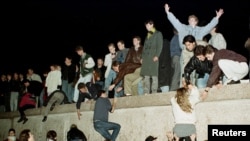The fall of the Berlin Wall 25 years ago on November 9th, 1989, was an event that had momentous geopolitical ramifications.
Most analysts and historians agree that former Soviet leader Mikhail Gorbachev played a pivotal role in the events leading up to the wall's demise and beyond. His policies of “perestroika” - restructuring - and “glasnost,” or openness, paved the way for the dissolution of communist power in Eastern Europe and ultimately led to the collapse of the Soviet Union.
Robert Legvold from Columbia University said a key factor was Gorbachev’s decision that he would not use force to suppress reformist aspirations in Eastern Europe.
Moscow Won’t Intervene
“Increasingly he made it apparent to the East Europeans that the Soviet Union would not do what it had done many times in the past: 1953 in Berlin, 1956 in Hungary and Poland, 1968 in the Czech Republic and so on,” said Legvold.
In July 1989, the so-called “Brezhnev Doctrine” was replaced by what one Gorbachev adviser described as the “Sinatra Doctrine,” based on the singer’s song My Way. In other words, the adviser said East European countries were now able to go their own way -- politically and economically.
In early October, Gorbachev marked the 40th anniversary of East Germany by attending celebrations in East Berlin.
Serge Schmemann, former Moscow and Bonn Correspondent for The New York Times, said Gorbachev was tough with East German leaders as tens of thousands of people marched with candles through the streets of the city.
“A huge march through Berlin. And at that time, Gorbachev made it clear to [Erich] Honecker, the East German leader, that he was not going to prop him up - that if he doesn’t get with it he’s going to be dumped by history. So the message from Gorbachev was not just symbolic, it was right there - I mean they were announcing to the East Europeans that we’re not going to prop you up - and that was huge,” said Schmemann.
A few weeks later Honecker was gone. And a month after Gorbachev’s visit, the Berlin Wall came down.
Changes in Eastern Europe
Robert Legvold said the fall of the Berlin Wall accelerated the demise of Communist Party rule throughout Eastern Europe -- a demise that started in Poland in June with the overwhelming victory of the Solidarity trade movement in free elections.
“It was a cascade,” said Schmemann. “Everything was sort of building at about the same time and the only thing that suggests a chain is the sequence: first Poland, then East Germany, then Czechoslovakia and Hungary and ultimately Bulgaria and Romania.”
Serge Schmemann said what happened in Romania at the end of December 1989 was very violent.
“Romania was the only one where there was shooting and about a thousand people lost their lives in Timisoara and elsewhere," he said. "And of course [Nikolai] Ceausescu and his wife were executed after a very hasty little something that passed for a trial.”
End of Cold War
Legvold and others said the fall of the Berlin Wall marked the end of the Cold War.
“The institutional basis for the Cold War, so far as it was focused in Europe, disappeared because the Warsaw Pact, as the opposing alliance, military alliance, to NATO, was scrapped. And of course that meant that Soviet power, military power, in Eastern Europe and on the border with West Germany, in East Germany, was now going to be pulled back. So for both institutional and conceptual reasons, it was the end of the Cold War.”
Serge Schmemann said the fall of the Berlin Wall had a profound impact on U.S.-Russian relations.
“It changed the entire map of the world. And it changed mainly our psychology. We all grew up -- I mean I certainly did -- in a Cold War psychology. There were ‘good guys’, ‘bad guys’- there was ‘them’ and ‘us’ - there were two powers,” said Schmemann. “If you had Zaire acting up, either they or we would control it in the interest of the great competition. So the loss of that has created a dynamic that we have not yet sorted out.”
Negative Impact on Russians
British historian Frederick Taylor says the fall of the Berlin Wall had a very negative psychological impact on Russians, especially the elite. He cites as an example Russian President Vladimir Putin.
“Putin was a KGB officer in Dresden, East Germany, when the wall came down -- and was well-known in the city. So he experienced it first hand, going from being a conqueror, in essence the person who walks down the street and is greeted with respect and fear in this satellite country, this puppet government subjected to the USSR’s control,” said Taylor. “He goes within a matter of weeks to being somebody who has really no influence over what is happening inside East Germany and in fact, of course, he soon ended up back in Russia. But I think a lot of people felt like him, shared that experience of humiliation at the loss.”
Historians say bringing back Russia to its former superpower status has been a key element of Putin’s foreign policy.
Taylor says the fall of the wall had another unforeseen consequence.
“The thaw in the Cold War allowed all these strange monsters - and we’re talking about probably Islamist terrorism and various other things - to emerge out of the kind of murk as the ice melted. And I think we’re still dealing with those problems,” said Taylor. “We have a world which is much more open. But in a way, that frozen world controlled fairly rigidly by two power blocs was, as long as you weren’t actually directly on the fault-line, was a safer place to live in. Whereas now anything can happen.”
And, said historian Frederick Taylor, it usually does.










